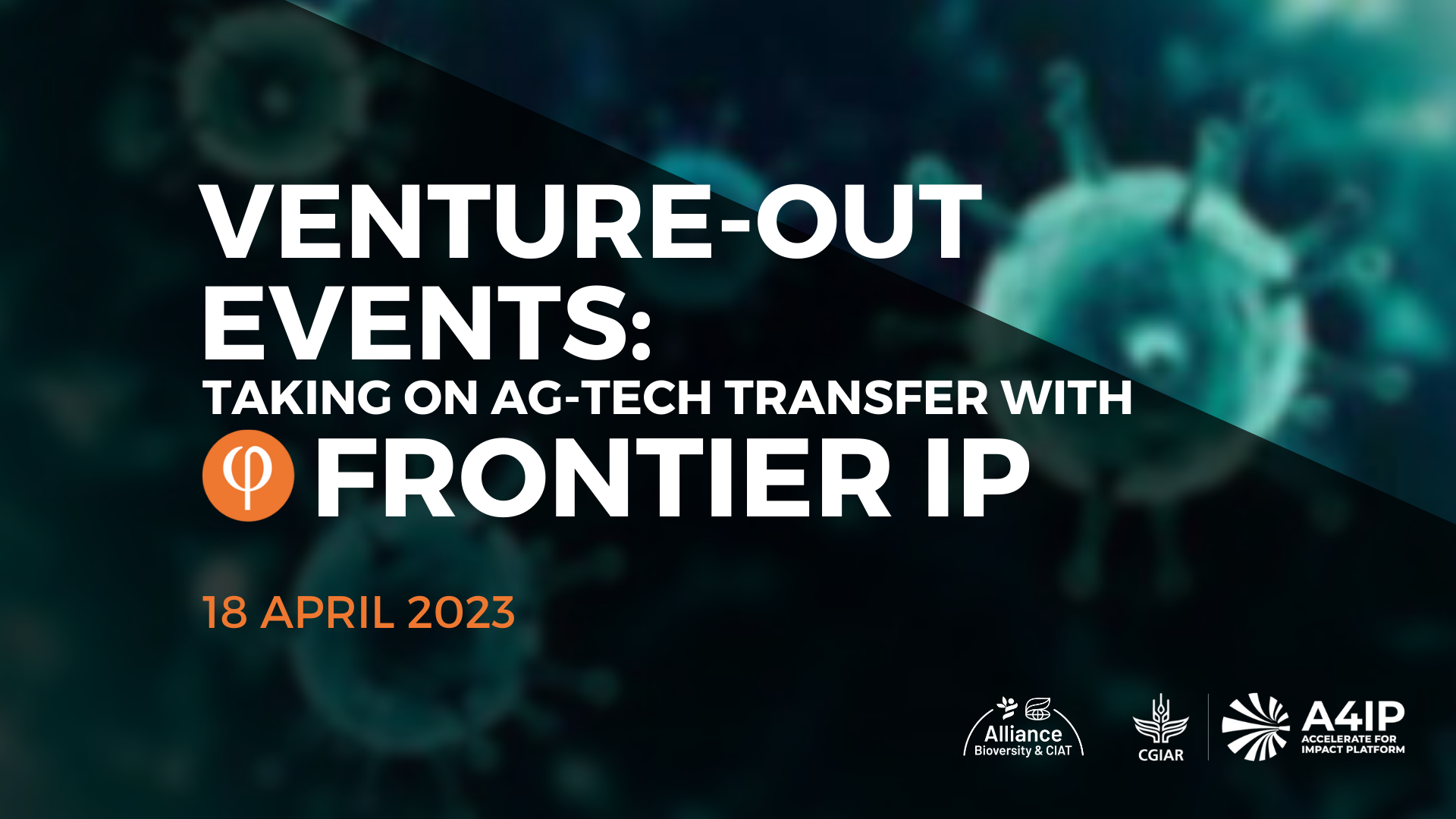Blog 3 Key Learnings on Tech Transfer from Venture-Out Event with Frontier IP

Watch the event, Venture-Out: Taking on Ag-Tech Transfer with Frontier IP – the Accelerate for Impact Platform highlights interesting takeaways from this discussion on how a strong network of partners between science and industry can help innovations break out of academic papers and scale to market.
On 18 April and now available for rewatch, the Accelerate for Impact Platform invited Neil Crabb, CEO of Frontier IP to showcase success stories of bridging research ideas from lab to market and to join a discussion with the Alliance/CGIAR’s Nekesah Wafullah, Venture Builder Expert A4IP, about how to draw lessons for agricultural technology transfer, highlight synergies and pathways for value creation with CGIAR research, and further inspire the entrepreneurial mindset and market-oriented approach among CGIAR’s scientists.
Frontier IP is a specialist in creating and supporting high growth potential companies from intellectual property generated by universities, academics and other researchers. They establish deep relationships with institutions and industry to proactively source potential spinouts; provide hands-on commercialization support, tech validation, early industry engagement and fund raising.
Together we asked, how can we work to proactively source innovation for spinouts, build an ecosystem of partners, and successfully bring innovations from lab to market? And what does technology transfer for the agricultural sciences have to learn from leaders in the innovation ecosystem?
“Choose a partner that aligns to your likes and interest, as it makes it easier to interact and sell your ideas,” said Nekesah Wafullah on her main takeaway from the event. “And also create a clear pathway for successful commercialization of research technologies and innovations.”
KEY LEARNINGS FOR AG-TECH TRANSFER:
1. Academics can be more proactive to seek out industry partners
2. Depth of work within specific clusters will generate stronger networks
3. Demonstrating actionable success of the technology early is vital
1. Academics can be more proactive to seek out industry partners
When academics establish relationships with external partners like those with industry expertise, they can more effectively assemble a team with complementary skillsets, gain a better understanding of the commercial process, and leverage their resources.
From the event: “It is important that if you're trying to commercialize your technology, that you learn something about speaking the language of business to create an overlap," said Neil Crabb. “It isn't about making academics into CEOs. It's about enabling academics to work with people as part of a team that can come in and help with that.”
2. Depth of work within specific clusters will generate stronger networks
Specialization and cultivating a depth of expertise within a given cluster will lead to more effective commercialization strategies, given the needs and constraints of unique agricultural and local challenges.
From the event: “How do we actually source innovation ourselves? … The first thing is to focus on clusters, because it means that you're building up networks with repeat connectivity ... it's easy to have a repeat dialogue with people. You can then leverage that to get a better understanding,” Neil Crabb said.
3. Demonstrating actionable success of the technology early is vital
Early success of a technology is vital to demonstrate to partners the relevance of the innovation for the market environment, and scaling success stories from within the organization is very important for this.
From the event: “The single most important thing I would say is getting to something where you can actually show the technology working ... The reason for that is that this reproducibility problem and the ability to dialogue on an equal footing with industry ... If you can do that early, you can accelerate early on,” Neil Crabb said.
Watch the event and build on these ideas by sharing with a fellow innovator. By strengthening technology transfer mechanisms, we can more effectively translate CGIAR’s wealth of groundbreaking research advancements into products and services that generate real impact for end users and drive food systems transformation and sustainable development goals overall.
_____
The Accelerate for Impact Platform (A4IP) is the Alliance/CGIAR’s venture-space to co-design, accelerate and fund market-driven and multidisciplinary innovation at the nexus of agriculture, environment, and health: Learn More
Get in touch at [email protected]
